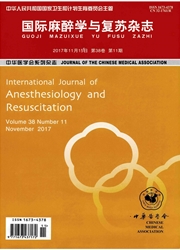

 中文摘要:
中文摘要:
背景非甾体抗炎药物(non-steroidal anti-inflammatory drugs,NSAIDs)是一类具有抗炎、镇痛和解热等作用的药物,其主要通过抑制环氧化物酶阻断花生四烯酸合成前列腺素而发挥解热、镇痛、抗炎作用。近年来,NSAIDs与麻醉药品并用于围手术期镇痛取得了良好的临床效果,尤其被广泛应用于手术后镇痛。目的吻合口漏是结直肠外科最严重的并发症之一,NSAIDs是否影响结直肠吻合口的愈合、增加吻合口漏的发生率文献报道不一。内容总结近年来关于NSAIDs对人体及实验动物结直肠吻合口愈合影响的代表性文献。趋向为手术后合理、安全使用NSAIDs提供参考,并总结NSAIDs对结直肠吻合口愈合影响的可能的机制。
 英文摘要:
英文摘要:
Background Non-steroidal anti-inflammatory drugs (NSAIDs) are a class of drugs with effects of antiinflammatory, analgesic and antipyretic.It is main by the way of blocking arachidonic acid synthesis of prostaglandins by inhibiting epoxide hydrolase to achieve the effects of antipyretic, analgesic and anti-inflammatory. In recent years, use of NSAIDS with narcotic drugs for perioperative analgesia achieved good clinical result,it particularly widely used in post-operative analgesia. Objective Anastomotic leakage is one of the most serious complications in colorectal surgery.The reports about whether NSAIDs affect colorectal anastomotic healing and increase the incidence of anastomotic leak are different. Content This review summarizes representative literature NSAIDs colorectal anastomotic healing in humans and experimental animals in recent years. Trend This review provides a reference for the safe use of NSAIDs and summarizs the impact of NSAIDs on colorectal anastomotic healing mechanism.
 同期刊论文项目
同期刊论文项目
 同项目期刊论文
同项目期刊论文
 期刊信息
期刊信息
